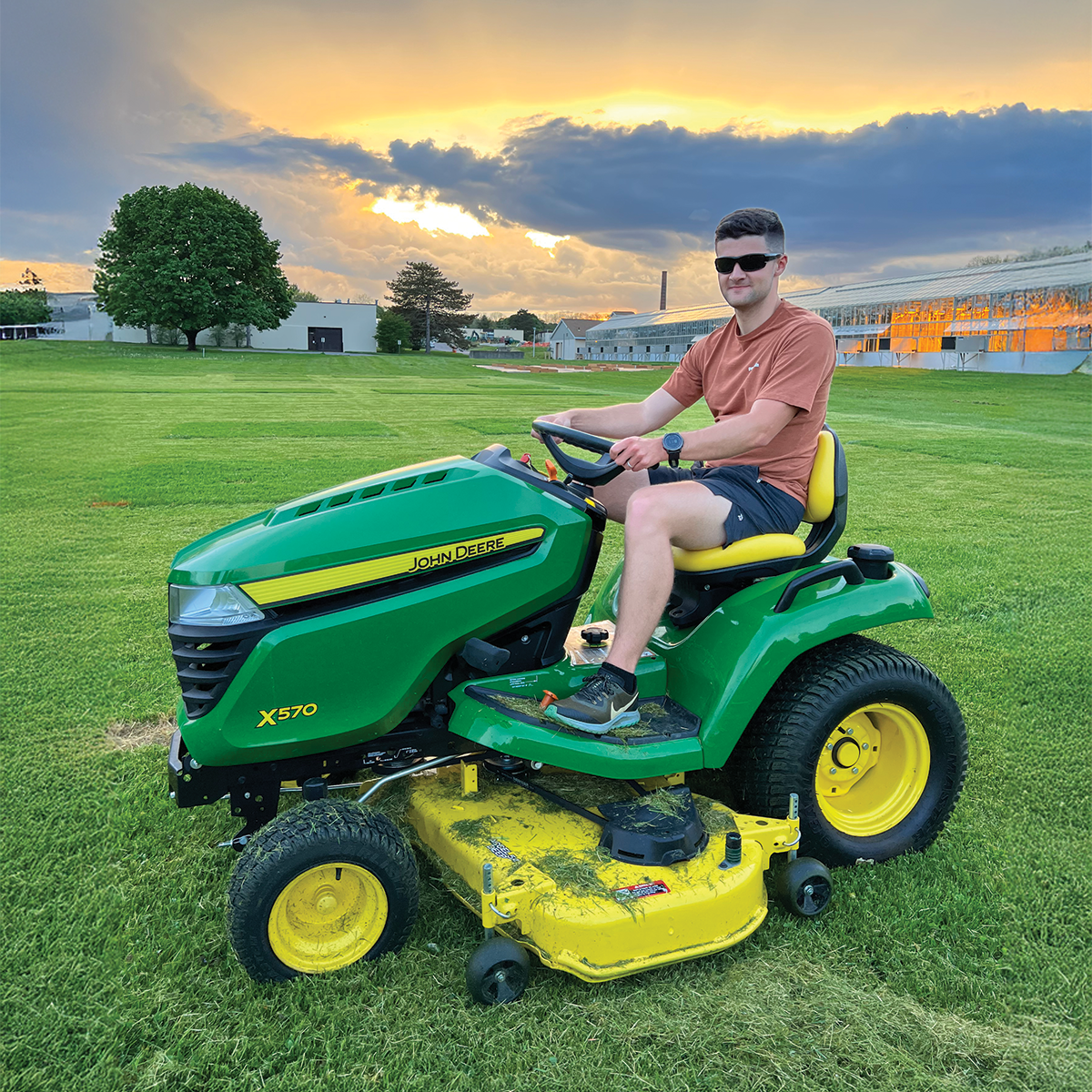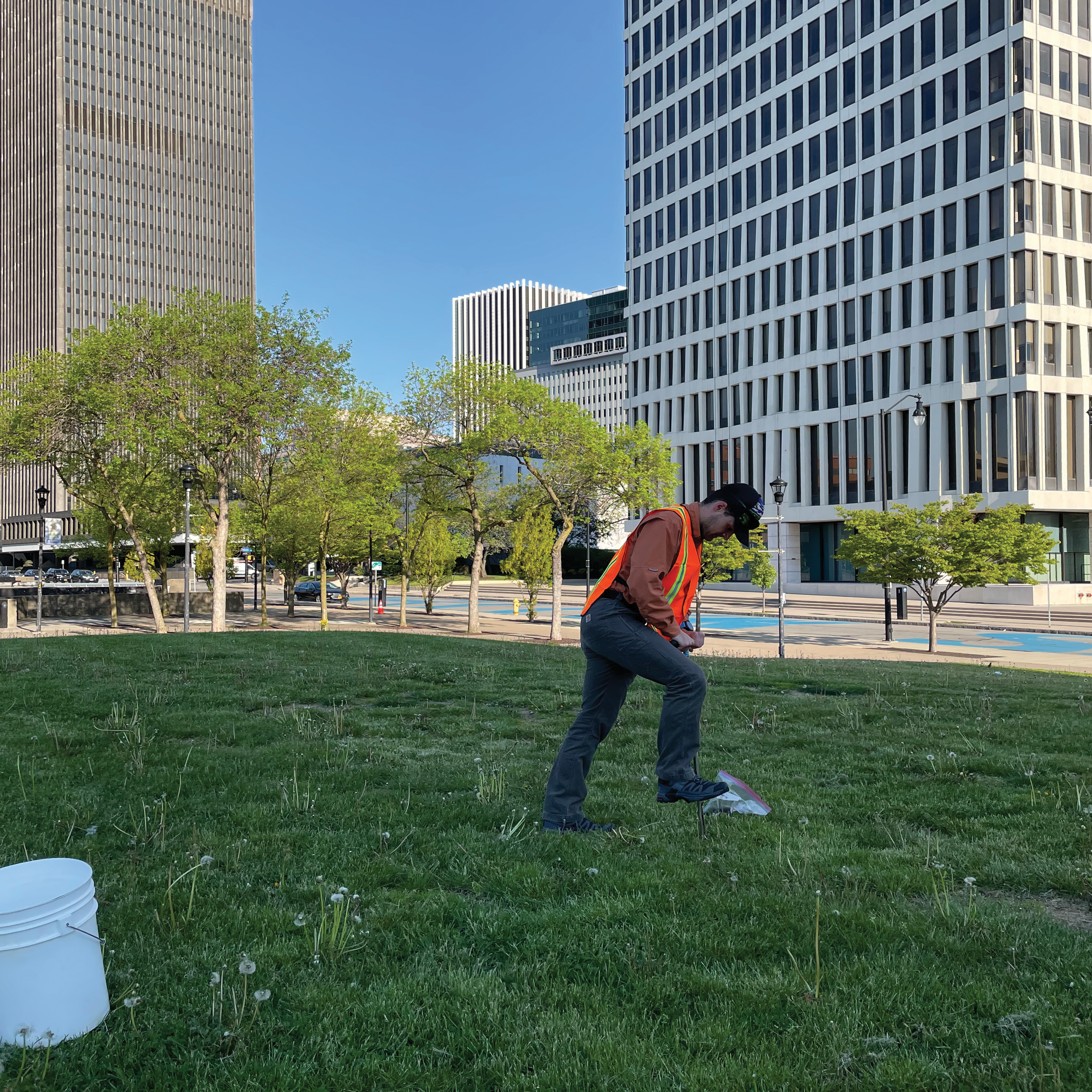
5 minute read
Feature
A blast from the past: Welcome Back Dr. Hayden Bock !
Since August of 2024, the Pennsylvania State University Department of Plant Science has had a new postdoctoral scholar; Dr. Hayden Bock. He looks a little older than the last time we saw him, which was in the late twenty-teens. Back then Hayden made for a memorable undergraduate student, participating in field research with numerous labs across the College of Agricultural Sciences. Hayden completed his BS in Plant Science (Agroecology option), earning Minor degrees in both Entomology and Agronomy, in May 2020.

Hayden then headed north from Happy Valley to pursue a doctorate in Entomology at Cornell University. Hayden’s thesis research evaluated insect ecology, specifically the effects of urbanization and greenspace management on soil mesofauna biodiversity and function. Again, Hayden proved enthusiastic and volunteered support for numerous related research activities.
Hayden’s research at Cornell investigated managed turfgrass systems to facilitate deeper understanding of the basic biology and ecology of soil invertebrates. A significant facet of this research utilized a gradient of urban parks across the Rochester (NY) metropolitan area to quantify the interplay of urbanization, soil, and socioeconomic forces in shaping the community structure and function of soil invertebrates in turfgrass lawns. Broadly, this project demonstrated that urbanization has a unique influence on soil food webs compared to aboveground communities.
Meanwhile, he followed up on prior Penn State undergraduate research to co-author two refereed papers in 2021; “Tree-induced alterations to soil properties and root-associated microorganisms following 23 years in a common garden.” By Yates, C., Guo, J., Bell, T.H., Fleishman, S., Bock, H., Trexler, R., Eissenstat, D. M., and Centinari, M. (Plant and Soil); and “Influence of cover crops on deep soil environment in Noiret vineyards.” By Fleishman, S., Bock, H., Eissenstat, D.M., and Centinari, M. (Agriculture, Ecosystems and Environment).
Given the co-authors of published research he engaged as an undergraduate, you may not be too surprised to learn Hayden’s postdoctoral scholar appointment is in the Fleishman Root Lab. But the Turfgrass Team was pleasantly surprised when Hayden presented the biogeochemical implications of common turfgrass mowing practices as a critical research question he sought to address. Thus, with Dr. Jason Kaye, distinguished prof. of soil biogeochemistry, and Suzanne Fleishman, asst. prof. of root biology, I am excited to facilitate Hayden’s research examining mower height of cut and mowing frequency on rhizosphere dynamics and soil food web function.
In September, Dr. Bock submitted this research proposal to the Agriculture and Food Research Initiative (AFRI) Education and Workforce Development (EWD) program project. The USDAAFRI Postdoctoral Fellowships Program Area Priority seeks to develop new scientists and professionals to enter research, education, and/or extension fields in support of the food and agricultural sciences within the private sector, government, or academia.

This priority area encourages multidisciplinary, transdisciplinary, and applied approaches that involve industry participation and/ or international experiences (e.g., through collaborating mentors) as appropriate. The aim of this fellowship program is to afford qualified applicants two-years of funding that cultivates future leaders who will go on to solve emerging agricultural challenges of the 21st century.
Hayden has proven to be an industrious researcher, as his field sampling protocol includes evaluating the fate of root-derived carbon across treatments using periodic pulses of 13C labeled CO2. Microbial biomass and soil taxa will be sampled for 13C analysis to infer the quantity of root-derived C in each across treatments. Due to the complex and specialized nature of analyzing such low-mass samples (< 5 μg), Hayden has already arranged to collaborate with Dr. Stefan Scheu at the University of Göttingen in Göttingen, Germany. The Scheu lab is a well-respected soil isotope ecology lab known for highly specialized isotope instrumentation (mass spectrometer with adjoining elemental analyzer) that is well suited to the low-mass sample analysis needs of this work.
Regardless of the USDA-AFRI postdoctoral fellowship proposal outcome, Dr. Bock will continue conducting this field research already initiated at the Valentine Turfgrass Research Center. Dr. Bock will also support the instructional mission here at PSU by overseeing laboratory sections of Plant Nutrition, Turfgrass Nutrition, and Soil Ecology.
Hayden’s research efforts seek to make discoveries that may quickly translate to actionable and impactful applications, while also contributing to our fundamental understanding of the natural world. To this end, the bulk of Hayden’s research has been community-driven, leveraging urban lawns, especially public parks, as ready-made arenas to peer into the agroecological interactions of turfgrasses and their functions.
In his future research endeavors, Hayden hopes to partner with municipalities and homeowners to study inter-phyla interactions in turfgrass systems and the ecological processes they facilitate. He sees his future research career driven by the central theme of understanding dynamics between soil fauna, microbes, and plants (turfgrass and “lawns” more broadly), and how those dynamics may shape the crops susceptibility to pest pressures. This research theme is especially timely given the need to understand belowground processes in urban systems in the face of global change to create resilient turfgrass systems.
These are truly unique and exciting objectives.
Please join us in welcoming Dr. Hayden Bock (hwb5138@psu.edu) back to Penn State University!!!






